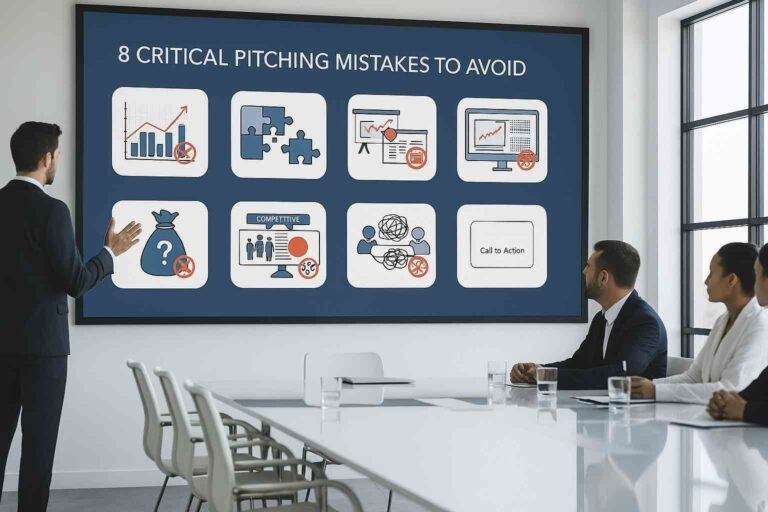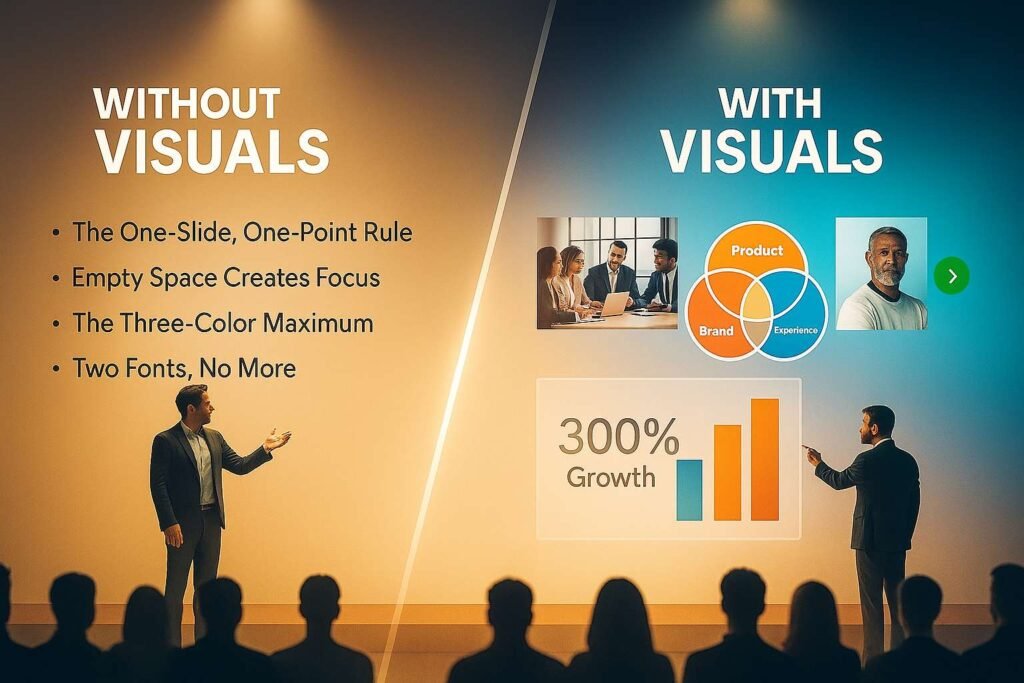In the harsh world of real estate negotiation, the effect that successful joint ventures (JV) can have can make a tremendous difference to their success. A real estate joint venture is a strategic partnership where two or more parties come together to develop or invest in a real estate project, sharing both the risks and rewards. If you are a seasoned developer or a fledgling investor in your early stages of learning about real estate development, creating a compelling pitch deck can be simply unavoidable. An easy-to-produce pitch deck not only allows the investors to comprehend the value of your project but also builds trust and credibility, both extremely important aspects in any joint venture (JV) partnership that seeks success in future endeavors.
This blog will lead you through the basic steps of building a real estate JV (joint venture) pitch deck. We will explain what a real estate JV pitch deck is, why it needs to be produced, and how to effectively structure and design one in order to get ahead in the competitive real estate market.
Definition and Purpose of Real Estate Joint Venture Pitch Deck
A Real Estate Joint Venture (JV) pitch deck is a presentation made to encourage prospective partners or investors to enter into a joint venture with the real estate industry. It’s a strategic tool that paints an outline for the project: its key details, financials, market potential, and how you will all benefit from teaming up. Aim: to make a case for the JV as a valuable opportunity that is clear, concise, and compelling—and thereby easy for potential partners to decide whether they want in or out.
Do Real Estate Joint Ventures Need a Pitch Deck?
Importance of a Pitch Deck in JV Success
A pitch deck is crucial to achieving success in Real Estate Joint Ventures. It is more than merely documentation, the pitch deck demonstrates a level of profundity. Even the smallest details matter An effectively designed pitch deck allows you to talk about all the different aspects of your project—from an analysis of the market, say to forecasts for future profits—in language a person interested in this area can understand. At the same time, it makes clear just what you offer. It gives one consistent and simple story to tell our partners–in this way, your entire JV bid becomes much more appealing A well-presented pitch deck can help you maintain a consistent and appealing storyline for your proposal to potential JV partners.
Building Trust
Trust is the cornerstone of any JV partnership. Increasing your credibility: Thus, a professional pitch deck will improve the degree to which you believe your research and planning went into your project. It demonstrates a level of professionalism that shows that you are serious about the joint venture and know enough to complete it. This can build confidence among potential partners and prompt them to go ahead with a JV. For these reasons, every real estate JV adopts the principle of letting a pitch deck design agency. They believe in leaving it all on a professional track; the thing that came up in writing ends up being put into a graph.
Example: Consider the scenario in which two developers are competing for the same JV opportunity. One of them presented an organized and engaging, visually beautiful pitch deck created by a professional pitch deck designer, while the other relied only on simple oral pitches barely interspersed with visual aids The developer with the detailed pitch deck is much more likely to impress the potential partner because he has given them a clear plan of action for Economics which covers all key components, reduces perceived risk and increases odds of collaboration ever succeeding.
Market Expectations
In today’s real estate market, potential investors surely have high expectations and quite reasonably so. Their request for a full business plan containing systemic research, a concise summary of likely returns, and a logical exposition of potential risks is to be expected. Without this level of information on offer, A pitch deck that reaches or surpasses these requirements can be the difference between success and bankruptcy, setting your JV proposal apart in an overcrowded marketplace. ‘Beat The Market’
Competitive Advantage
In a competitive real estate market, the deciding factor between pinning down a JV deal or losing out yet again is how strong its pitch deck is. When you present a clear and concise pitch deck, it is proof that you have done the research behind these numbers and didn’t just copy them from publicly available sources. It shows potential partners both what they get for their investment and how high the standards are for anything associated with their money… This advantage can be just what you need to clinch the entire contract.
How to Create a Real Estate JV Pitch Deck
Step-by-Step Guide
Creating a Real Estate JV pitch deck involves several key steps. Here’s a detailed guide on how to structure and design a pitch deck that will capture attention and drive results:
- Project Overview: Start with a high-level summary of the project. Include the location, type of development (e.g., residential, commercial, mixed-use), the scope of the project, and the primary objectives. This section should give potential partners a clear understanding of what the project entails and why it’s worth their consideration.
- Market Analysis: Provide a comprehensive analysis of the market conditions. Highlight trends that support the viability of the project, such as population growth, economic indicators, or housing demand. Include data and statistics that back up your claims, and explain how the project is positioned to take advantage of these market dynamics.
- Financial Projections: This is one of the most critical sections of your pitch deck. Provide detailed financial forecasts, including the total investment required, projected revenue, expected ROI, and exit strategies. Use charts and graphs to make the data easy to understand, and be transparent about the assumptions behind your projections.
- Partnership Structure: Outline how the JV will be structured. Detail the roles and responsibilities of each partner, the equity splits, and how decisions will be made. It’s important to be clear about who is responsible for what and how profits will be distributed.
- Benefits and Risks: Clearly articulate the benefits of entering into the JV, focusing on how it will be mutually beneficial for all parties involved. At the same time, be upfront about the risks associated with the project and how you plan to mitigate them. This transparency can help build trust and demonstrate that you’ve thoroughly considered all aspects of the venture.
- Visuals and Design: The design of your pitch deck is just as important as the content. Use professional design elements and visuals to enhance the appeal and clarity of your presentation. High-quality images, clean layouts, and consistent branding can make your deck more engaging and easier to follow.
- Tailoring the Message: Tailor your pitch deck to the specific needs and interests of your target audience. Whether you’re pitching to investors, developers, or partners, customize the content to address their particular concerns and priorities. This personalized approach can make your pitch more persuasive and relevant.
- Call to Action: End with a strong call to action. Clearly state what you want the potential partner to do next, whether it’s scheduling a follow-up meeting, requesting more information, or committing to the JV. Make it easy for them to take the next step.
Important Note:
A pitch deck that is structured and has visual appeal is very important in order to communicate your JV’s value proposition effectively. Created with diagrams and pictures, it helps to break complex information down into bite-sized chunks, so potential partners don’t need time; just get their heads around what’s involved in this project A strong pitch deck not only catches attention but also gives people a feeling of confidence that you can carry on as planned and bring your project to fruition.
Key Components to Include
- Project Overview: Highlight the location, scope, and objectives of the real estate project.
- Market Analysis: Provide data-driven insights into market demand, competition, and growth potential.
- Financial Projections: Offer a detailed financial breakdown, including investment requirements, ROI, and exit strategies.
- Partnership Benefits: Clearly outline the benefits of entering into the JV and how it will be mutually beneficial.
- Call to Action: End with a strong call to action, inviting further discussion and outlining the next steps.
Conclusion
A well-thought-out real estate JV pitch deck is a powerful tool to achieve joint venture agreements. It allows you to clearly communicate the value of your project, establish trust with potential partners, and stand out in a busy market. You can create a pitch deck that not only looks professional but also effectively delivers your point using the tricks outlined in this guide, thereby raising the probability of carrying successful JV deals through to completion.
Investing time and resources in creating a high-quality pitch deck can make a significant difference in the success of your real estate ventures. Remember, a compelling pitch deck is more than just a presentation—it’s your gateway to forming valuable partnerships that can propel your project to new heights.









